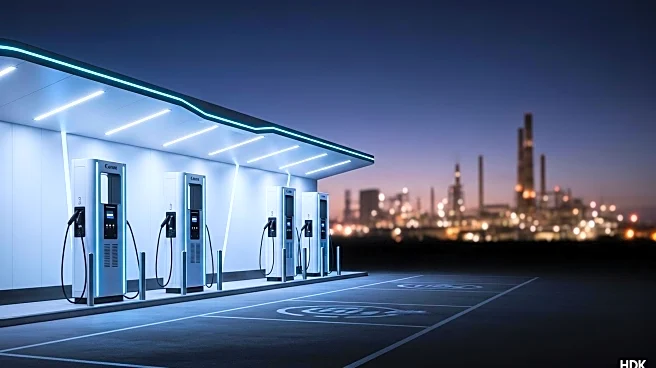What is the story about?
What's Happening?
Hyundai Motor Company has adjusted its financial expectations for 2025, citing the impact of U.S. tariffs. The South Korean automaker has lowered its operating profit margin forecast from 7-8% to 6-7% for the year. Despite this, Hyundai has increased its revenue expectations by 2 percentage points, aiming for a 5-6% increase compared to the previous year. The company announced these changes ahead of its first U.S. CEO investor day in New York City, led by CEO José Muñoz. Hyundai plans to expand its annual sales to 5.55 million units by 2030, a 34% increase from last year's figures. The company is investing $26 billion from 2025 to 2028 to enhance its U.S. operations, with a goal of producing over 80% of its U.S. vehicle sales locally by 2030.
Why It's Important?
Hyundai's strategic shift underscores the significance of the U.S. market in its global expansion plans. The decision to increase local production is a response to tariff challenges and aims to strengthen its manufacturing ecosystem. This move could bolster Hyundai's competitiveness in the U.S. automotive market, potentially leading to job creation and economic growth in the sector. The expansion aligns with broader industry trends towards localization and could influence other automakers facing similar tariff pressures. Hyundai's focus on the U.S. as a growth engine highlights the country's pivotal role in the company's long-term strategy.
What's Next?
Hyundai's ambitious plans will likely lead to increased investment in U.S. manufacturing facilities, potentially attracting attention from policymakers and industry stakeholders. The company's commitment to local production may prompt discussions on trade policies and their impact on international businesses. As Hyundai progresses with its expansion, it may face challenges related to supply chain management and regulatory compliance. The automaker's efforts to mitigate tariff effects could serve as a case study for other companies navigating similar economic landscapes.
Beyond the Headlines
Hyundai's expansion in the U.S. could have broader implications for the automotive industry, including shifts in labor dynamics and technological advancements in manufacturing. The company's focus on creating an efficient manufacturing ecosystem may drive innovation and set new standards for sustainability and efficiency. Additionally, Hyundai's strategy may influence bilateral relations between the U.S. and South Korea, as economic ties strengthen through increased investment and collaboration.















